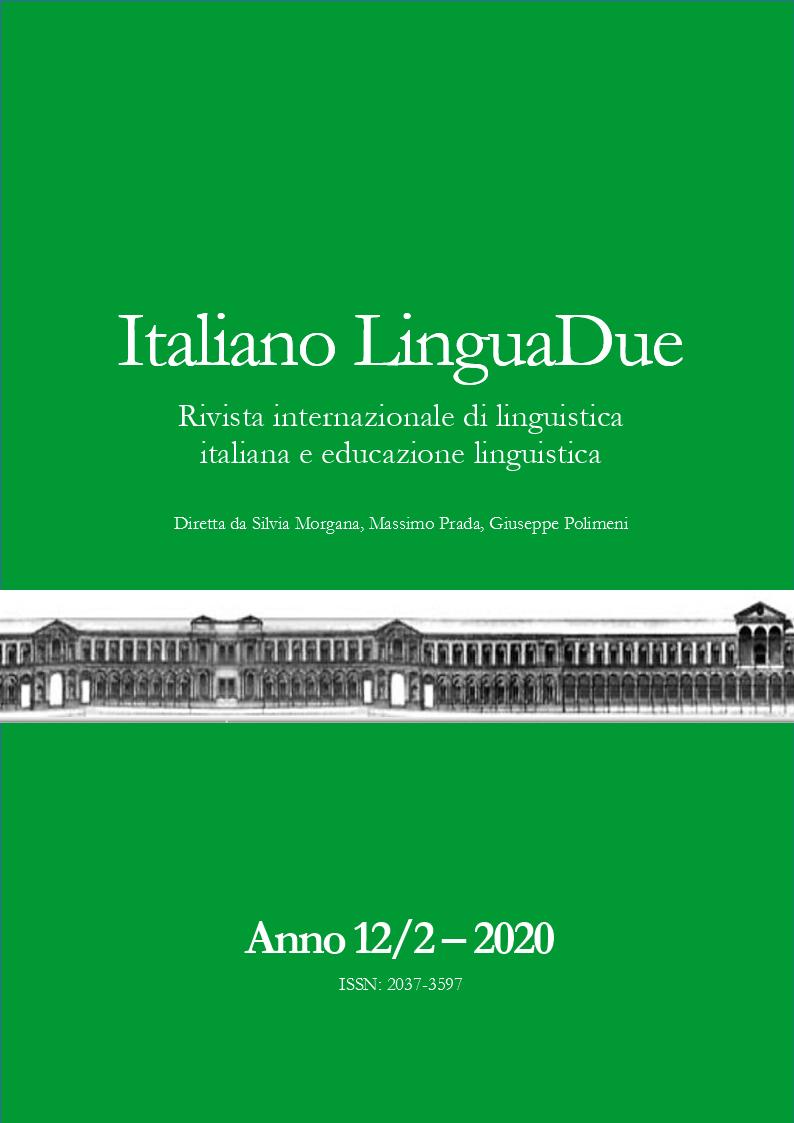LA LINGUA ITALIANA COME HERITAGE LANGUAGE NELLA COMUNITÀ ITALO-LEVANTINA DI ISTANBUL: UNO STUDIO SUL SOGGETTO POSTVERBALE
DOI:
https://doi.org/10.13130/2037-3597/15060Abstract
Lo studio riporta i risultati di un esperimento riguardante la produzione e la preferenza di soggetti postverbali in italiano da parte di 8 Heritage Speakers adulti dominanti in turco. I partecipanti appartengono all’antica comunità italo-levantina di Istanbul, che da sempre mantiene un repertorio plurilingue comprendente italiano, francese, greco e turco. Secondo l’Interface Hypothesis strutture di interfaccia tra sintassi e discorso risultano particolarmente vulnerabili nelle situazioni di plurilinguismo – compresa l’acquisizione delle Heritage Languages – a causa dell’influenza cross-linguistica della lingua dominante e dei costi cognitivi del plurilinguismo. L’impatto di questi fattori e del ruolo del turco come lingua di istruzione elementare e media è stato valutato confrontando i risultati del gruppo sperimentale e di un gruppo di controllo di 10 nativi monolingui adulti in un test di combinazione di parole e uno di preferenza. I dati appaiono in linea con precedenti studi sulla stessa struttura in diverse situazioni di bilinguismo. Nella produzione di strutture VS gli Heritage Speakers si mostrano significativamente meno accurati rispetto alla controparte monolingue, mentre nella preferenza non emergono differenze significative. La discrepanza si riconduce alla differenza di carico cognitivo impiegato nei due tasks e rappresenta una conferma del ruolo dei fattori cognitivi nelle differenze di comportamento linguistico tra monolingui e plurilingui. Differenze interne al gruppo sperimentale emergono nella produzione secondo una scala di accuratezza che va dal sottogruppo di informanti che non hanno frequentato scuole turche a coloro che le hanno frequentate per otto anni consecutivi (6-14 anni). Il dato conferma il ruolo dell’educazione formale e delle scelte di vita del parlante nel favorire l’acquisizione della heritage language, e spinge ad una riflessione sull’importanza della scolarizzazione per la salvaguardia delle lingue minoritarie.
The Italian language as heritage language in the Italian-Levantine community of Istanbul: a study on the postverbal subject
The study reports the results of an experiment targeting the production and interpretation of postverbal subjects in Italian by multilingual Heritage Speakers of Italian whose dominant language is Turkish. All participants belong to the ancient Italian Levantine community of Istanbul, whose members have always maintained a multilingual linguistic repertoire that includes Italian, French and Greek, as well as Turkish. According to the Interface Hypothesis, syntax-discourse interfaces prove to be problematic in different bilingual situations – including the acquisition of Heritage Languages – due to both cross-linguistic influences and cognitive factors related to bilingualism itself. The role of these factors and that of Turkish as the language of primary and secondary education were assessed while comparing the results of the experimental group and a control group of 10 Italian, monolingual natives in a word combination task and a preference task. Data are consistent with previous studies on the same structure in different bilingual situations. When producing VS structures, the Heritage Speakers were found to be significantly less accurate compared to their monolingual counterparts, while with regard to preference there were no significant differences. The discrepancy is explained by the diverse cognitive burdens involved in the two linguistic tasks, thus confirming the role of cognitive factors in differentiating linguistic behaviors between monolinguals and bilinguals. Differences within the experimental group arose in production according to an accuracy pattern that proceeded from the subgroup of informants who had not gone to Turkish schools to those who attended them for eight consecutive years (between the ages of 6-14). Data confirmed the role of formal education and speakers’ life choices in favoring the acquisition of HLs, thus offering food for thought about the importance of schooling in the preservation of minority languages.




